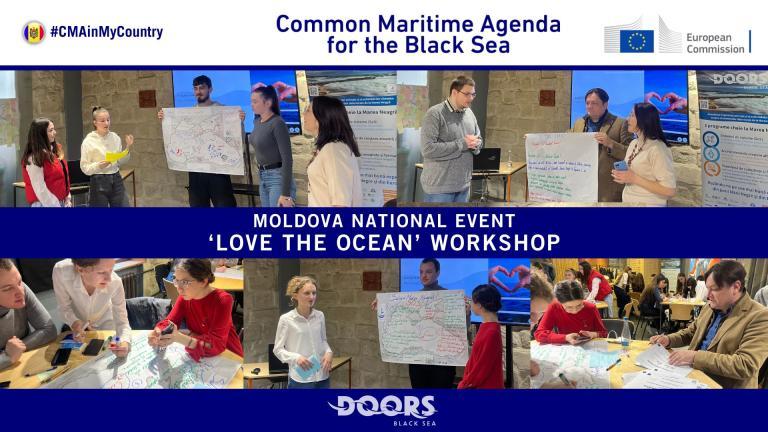The National Hub of Moldova, in collaboration with the DOORS project (Developing Optimal and Open Research Support), hosted a #CMAinmycountry event, under the theme of “Love the Ocean”. This event took place on the 7th of March 2025, in Chișinău, Republic of Moldova. DOORS will continue organising such events across all the Black Sea countries, promoting the importance of protecting marine ecosystems, and spreading the “loving” the Black Sea. The “Love the Ocean” workshop coincided with International Women’s Day on the 8th of March, celebrating both marine conservation and the vital role of women in environmental protection.
The workshop featured interactive sessions and Q&As, encouraging active participation from young students and teachers from schools and universities in the Republic of Moldova. It was centred around five key objectives:
Objective 1: Raise awareness and highlight the Black Sea’s importance and its ecological challenges, encouraging participants to appreciate and protect marine ecosystems.
Objective 2: Foster ocean literacy by connecting youth (aged 16–21) with marine scientists, demonstrating how the Ocean (and Black Sea) influences people, and vice versa.
Objective 3: Empower youth to develop their ocean literacy ideas and campaigns, becoming Black Sea ambassadors within their local communities.
Objective 4: Promote responsibility toward actions that have a positive environmental impact.
Objective 5: Facilitate a platform for science–society dialogue, where young people ask questions, explore marine careers, and engage with experts in an open, interactive format.
The workshop began with a friendly icebreaker session, setting the stage for engaging discussions. Participants shared their personal memories of the Black Sea, which helped the event facilitators introduce key points about marine conservation. The discussions covered major concerns about the Black Sea and ongoing marine science efforts. This led to data sharing from the DOORS project, showcasing the System of Systems (SoS) platform. Participants were intrigued by the SoS platform, exploring its features and understanding how open-source solutions can support Black Sea stakeholders in monitoring and analysing marine ecosystems.
The Q&A session provided an opportunity for participants to deepen their understanding of the CMA and the significance of collaboration between scientists, NGOs, and local authorities in monitoring and protecting the Black Sea, under the CMA umbrella. The workshop activities also fostered creativity. Divided into small teams, participants put their ideas into action, brainstorming Ocean Literacy events designed to engage diverse audiences—from schoolchildren to policymakers. Discussions were lively, with teams exploring innovative event formats like educational workshops, beach clean-ups, art exhibitions, and interactive science fairs.
Each group crafted a unique event concept, focusing on raising awareness about the ocean’s ecosystems, climate challenges, and conservation efforts. They identified key messages, anticipated impact, and potential collaborators to bring their ideas to life. By the end of the session, every team presented their event proposal, sparking further discussions and inspiring new approaches to marine awareness and engagement. This dynamic session not only encouraged knowledge-sharing but also empowered participants to take an active role in shaping public awareness and advocacy for ocean conservation.
Future efforts will focus on promoting upcoming events and involving participants in blue economy projects and renewable energy initiatives from marine sources. The young participants are encouraged to present the workshop outcomes to their local schools, community centres or via social media to increase awareness and create a network of Black Sea young advocates, sharing their experiences and ideas on how to improve the protection of the marine ecosystems of the region.

